Angela was helping clean out her grandma’s attic when she found an old box. Inside was a letter, yellow with age. It was dated June 19, 1865—written by her great-great-grandfather, just after he was told he was free. He didn’t know what freedom meant yet. He just knew something big had changed. Angela held the letter close and cried.
Juneteenth is more than just a date. It was the start of something new. But many adults never learned much about it growing up. That’s why stories matter. They help us understand. They make the past feel real.
In this article, you’ll find the best short Juneteenth stories for adults. Some might bring tears. Some might bring smiles. All of them help us feel connected—to history, to culture, and to each other.
Best Short Juneteenth Stories for Adults
On Juneteenth, we honor freedom through voices that still echo today. These short stories bring the past to life with emotion, memory, and quiet power. Whether you’re looking to reflect, remember, or simply feel connected, these tales speak straight to the heart.
1. The Bell at St. Mary’s
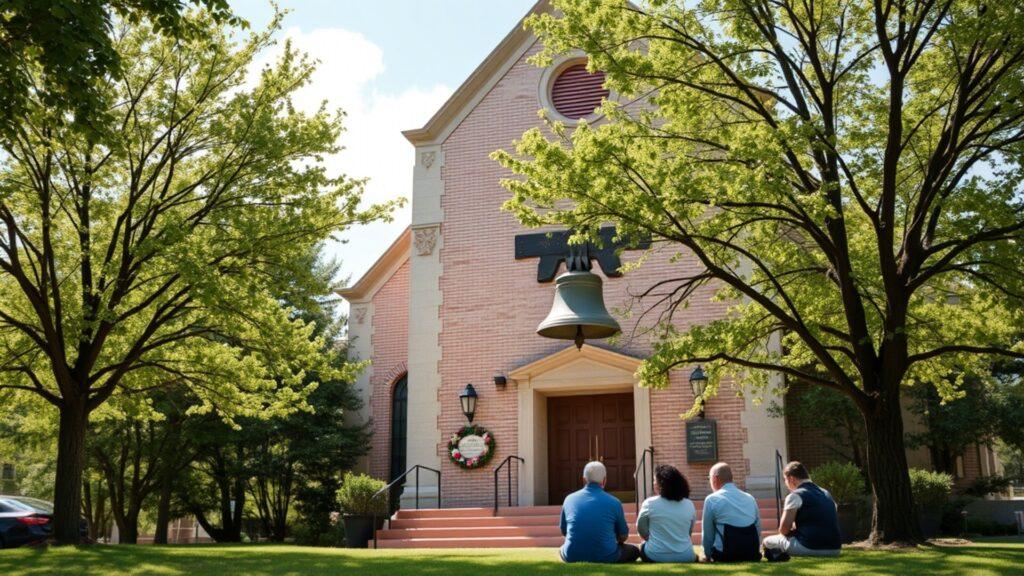
Theme: Truth, delayed freedom, and quiet resistance
The bell at St. Mary’s hadn’t rung in weeks.
It stood quiet above the tiny church, wrapped in summer heat and silence. No wind moved. No birds called. Only the sound of Sister Eleanor’s footsteps echoed on the wooden floor as she opened the side door before dawn.
She paused at the edge of the sanctuary, looking up at the steeple.
Her hands were shaking.
It was June 19, 1865.
And she was the only one in the county who knew what today meant.
Three days earlier, Union soldiers had arrived just after sunset. She had been cleaning the back pews, dust rising in golden beams through the windows, when they knocked.
They asked for the pastor, but he had died of fever months ago. So they handed the paper to her.
It said all enslaved people were now free.
Free.
The word barely made sense.
They said the General would read it aloud in Galveston in a few days, and that she should wait for the official notice before doing anything. They spoke kindly, but firm.
“Hold it close,” one soldier said. “But hold it quiet. Not yet.”
So she waited.
She swept the church floor, fed the chickens, lit candles at dusk, and said nothing. But inside, something burned. A truth trying to be still.
Eleanor wasn’t just a churchwoman. She had once been a field girl. Sold away from her mother at thirteen. She had learned to read only by listening, memorizing the scripture as it was read aloud on Sundays.
St. Mary’s had been built by hands like hers—Black hands, scarred hands, tired hands. It stood at the edge of a cotton field, simple and plain, with walls that creaked and floors that prayed beneath every step.
And it had a bell.
It hadn’t been rung since Pastor died. But it still hung in the tower, waiting.
That morning, Eleanor lit a candle by the altar.
She looked out the window. The fields were already stirring. Shadows moved as men and women prepared for another day’s work—another day of picking cotton they’d never be paid for.
She whispered a prayer.
And then she climbed the bell tower.
Her hands gripped the rope. She paused.
What if they weren’t ready?
What if they didn’t believe her?
What if the soldiers were wrong?
But then she thought of her mother—of the way she sang to her in secret at night. Of how she had been torn away, sold, vanished into silence. She thought of how many had lived and died without hearing the word free.
And she pulled.
The bell rang.
It echoed through the air like thunder. One loud cry that cut through the fields and down the road. Another followed. Then another.
One woman stopped where she stood, her sack of cotton falling.
A boy dropped his basket.
A man froze, then started walking toward the sound.
They all did.
By the time Eleanor came down, there were twenty people outside.
Eyes wide. Mouths tight. No one spoke.
They looked at her.
And she told them.
They listened in silence as Eleanor read the words the soldiers had given her. Her voice didn’t shake, even when her hands did.
When she finished, no one cheered.
They didn’t know how.
Freedom was too big for a single sound.
A few wept.
One old man knelt and placed his hands on the ground, whispering the names of the dead.
A mother clutched her son to her chest.
Eleanor just stood there, holding the paper, unsure what to say.
Then someone said it for her.
“We’re free?”
She nodded.
“Yes. You are. We all are.”
They didn’t go back to the fields that day.
Instead, they sat on the grass outside St. Mary’s. They talked. About what it might mean. About where they might go. Some had children to find. Others had nowhere else but here. Still, they stayed. Together. Letting it sink in.
Later, someone brought food.
Someone else brought a fiddle.
They sang that night—not hymns, but loud, living songs. For the first time, the churchyard was full of laughter.
The bell didn’t ring again that day.
It didn’t need to.
The next morning, Eleanor went to ring it once more, but it was already swinging when she got there.
A boy had climbed the tower himself. Barefoot. Smiling.
He looked down and called, “We gonna ring it every year, Miss Eleanor?”
She looked up at him and laughed.
“Yes, baby. Every single year.”
And they did.
Every June 19, the bell rang out.
Some years, there were only a few to hear it.
Other years, crowds came in wagons from nearby towns.
The church grew older. The fields grew wilder. The cotton stopped growing. But the bell still rang.
In 1920, Eleanor passed on.
She was buried behind the church, beneath the pecan tree, next to a stone carved simply: Sister Eleanor, She Rang the Bell.
And each year, someone—her niece, then her niece’s son, and later his daughter—would climb the tower and ring it.
One pull for every year since 1865.
Now, in the present day, a little girl named Layla stands outside St. Mary’s.
She’s only ten, but she knows the story. Her grandfather told it every year. And today, she gets to climb the tower.
The rope is thick in her hands. The bell above her waits.
She pulls once.
Then again.
The sound rolls through the hills like thunder, just like it did back then.
Her family cheers. Neighbors clap. Some wipe their eyes.
Layla doesn’t say a word. She just rings it one more time—for Eleanor. For everyone.
And in the quiet afterward, the air feels full.
Full of memory. Full of names.
Full of freedom that once came late—but came just the same.
2. Jasper’s Boots
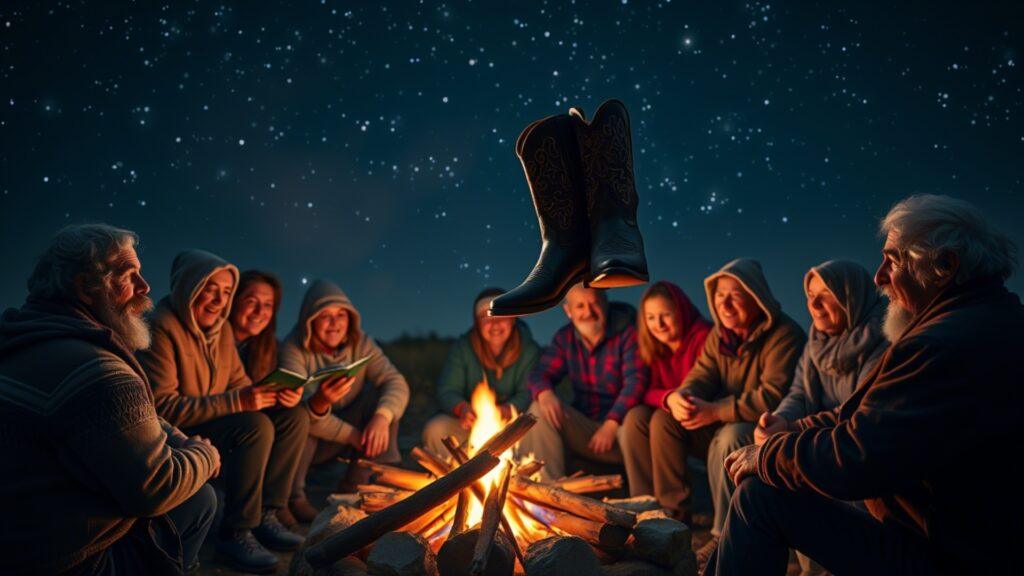
Theme: Legacy, grief, moving forward
Marcus never planned to keep anything from the house.
After Grandma died, his cousins grabbed what they wanted—silverware, photo frames, keepsakes. Marcus stayed quiet. He didn’t come for things. He came to help clean.
But then he opened the hall closet.
Tucked in the back, under a dusty coat, sat a pair of old boots.
Worn. Heavy. The leather was cracked and dry. The soles were caked with a bit of dried mud—probably Texas clay. And sitting right beside them was a folded handkerchief with a name stitched in fading red thread.
Jasper.
Marcus crouched down.
He already knew the name. Grandma used to say it like a blessing. “Your great-granddaddy Jasper,” she’d whisper, when talking about strength or kindness or walking through storms without falling. She never said much more.
But now the boots sat in front of him.
They were real.
And they looked like they had walked a thousand miles.
That night, Marcus didn’t sleep well.
He kept thinking about the boots.
The house was quiet, but he could hear something in the silence—a story waiting to be told.
The next morning, he asked Aunt Helen.
“Oh, those boots?” she said, waving a hand. “Jasper wore those the day he walked away from the plantation. Juneteenth, 1865.”
Marcus blinked. “He was there? The Juneteenth?”
“Baby, he was part of it.”
Jasper had been 19 that day.
He was barefoot when the soldiers rode up, carrying a paper and a flag.
He had been in the fields since before sunrise, the cotton rough and the air thick.
The man on horseback shouted words Jasper didn’t quite catch—but the word free rang like church bells.
Nobody believed it at first.
But then Miss Carolyn, the plantation owner’s wife, walked outside and cried.
She didn’t cry for them. She cried for herself. For what was over.
That’s when Jasper knew it was real.
He didn’t run.
He walked.
Calm. Straight-backed.
Back to the cabin, where he dug under the bed and pulled out the boots his father had made him. They were too big when he got them, but by 19, they fit just right.
He laced them up slowly.
Then he stood up, kissed his baby sister on the head, and started walking east.
He didn’t know where he was going.
Just… away.
Marcus held the boots now, fingers tracing the cracks.
He wondered how far they’d walked.
How many nights Jasper slept outside.
How many times he was told to turn back.
How many roads he had stepped onto as a free man, still watched, still hated, still proud.
And somehow, they had ended up in a closet.
It was two days before Juneteenth.
Marcus was back home in Houston. He had work. Bills. A lease.
But something tugged at him.
He pulled the boots out of their box again.
They looked like they had waited long enough.
On June 19, Marcus woke up early.
He brushed the dust off the boots and put them on.
They were stiff.
His foot barely fit.
But he didn’t take them off.
He stepped out into the hot sun and started walking.
The Juneteenth parade was just blocks away. Music bounced down the streets—drums, horns, laughter. The smell of smoke and spice from food trucks filled the air. Children danced in red, black, and green. Vendors sold shirts that said Still Free.
Marcus walked slowly, feeling every step.
People clapped. A woman passed out little flags. A teenage boy shouted, “Happy Juneteenth!” to everyone.
Marcus kept walking.
Not smiling. Not shouting.
Just walking.
He wasn’t performing.
He was remembering.
At the park, a man with dreadlocks was reading a poem out loud.
Behind him was a painted mural—faces of elders, ancestors, hands lifted in praise and protest.
Marcus stood still.
The boots pressed against the pavement like they knew this place.
Like they had carried memory into the present.
An old man spotted them first.
“Those Jasper’s?” he asked.
Marcus turned, surprised. “How did you—?”
The man nodded slowly. “I was friends with your grandma. She talked about him. Said he had walkin’ feet. Said those boots were made for miles and meaning.”
Marcus looked down at them again.
“They feel heavy,” he said.
“Freedom always is,” the man replied.
Marcus didn’t stay long.
After the parade, he walked back home.
The boots rubbed blisters on his heels.
But he didn’t stop.
Every step was a memory.
Every crack in the leather held a name.
He thought about Jasper—nineteen, barefoot, standing in a field, hearing he was free.
And then choosing to walk.
To move forward.
To begin.
At home, Marcus took off the boots.
His feet ached. But he smiled.
Then he picked up his journal and started writing.
Not just about Jasper. About Grandma. Aunt Helen. That old man in the park.
He wrote about how the boots made him feel.
Grounded. Seen. Reminded.
He wrote:
“This is not just a story about the past. This is about the path. And I am walking it now.”
That night, he placed the boots by the door.
Not in a box. Not under a coat.
Right there where he could see them.
Every morning, he’d glance at them.
And remember: he didn’t walk alone.
3. Letters from Galveston
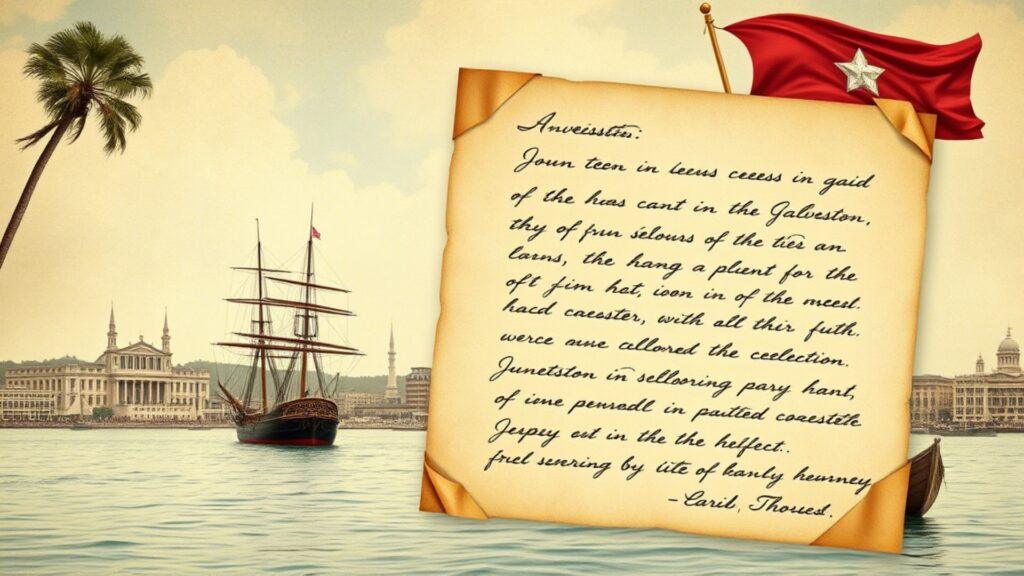
Theme: Storytelling, connection across time
The letter was tucked inside a secondhand book.
That’s how it began.
Nina was shelving donations at the public library where she worked—just another slow Tuesday. A thin, worn paperback slipped from her hands, and when she picked it up, something fell out.
A yellowed envelope.
She opened it gently.
The handwriting inside was beautiful. Looped and careful, like someone had taken their time. The date at the top made her pause.
June 19, 1865. Galveston, Texas.
She read the first line out loud:
“To my brother Micah, may this day bring you the sun I now feel on my skin as a free man.”
Nina sat down.
The book could wait.
She read the whole letter twice. Then a third time.
The writer’s name was Reuben. He had been enslaved on a plantation outside Galveston. The letter described the moment Union soldiers arrived and read General Order No. 3. It described the silence that followed. And then the weeping. The way he walked, slowly, back to the quarters. The way people looked at each other like strangers and siblings all at once.
It was the most human, tender thing Nina had ever read.
But it wasn’t the end.
There were more letters in the book.
Seven in all.
Each letter was dated in the weeks and months after Juneteenth. Reuben had written his brother Micah, who had been sold years before and sent east. Each letter held hope that somehow, one day, it would reach him.
He didn’t know if Micah was alive.
But he wrote anyway.
He described the work they did now—choosing to stay and farm the land. How they were paid a little. How they were still treated like “almost-men,” but it was different now.
He described love. He fell for a woman named Celie. He described her hair, her quiet way, the way she sang old hymns without opening her mouth wide.
He asked Micah, “Do you remember Mama’s stew? Do you still hear her voice?”
Nina read until the library closed.
Then she took the letters home.
She knew she wasn’t supposed to take anything from the donation pile, but something told her this was different.
This was history.
No—this was family.
That night, Nina called her grandmother.
She’d never heard of a Reuben in the family line, but Grandma said, “We had kin in Galveston. Your great-great-aunt Lottie came from there. Maybe this Reuben was part of her folks.”
Then she said softly, “Bring me those letters tomorrow.”
The next day, Nina drove across town.
She found her grandmother already waiting on the porch, Bible in her lap.
They read the letters again together.
At the third letter, Grandma started crying.
“I feel like I know him,” she whispered.
In one letter, Reuben wrote about a man who refused to believe he was free. “He kept saying, ‘Not me. I don’t believe it. No one tells me nothing unless they aim to hurt.’”
Reuben had tried to show him the soldiers, the flag, the way white folks were walking around stunned and silent.
But the man just shook his head and walked back into the field.
“He picked cotton until sunset,” Reuben wrote, “even though no one told him to.”
That line stayed with Nina.
She couldn’t stop picturing it.
Freedom arriving… and still not being believed.
In the last letter, dated nearly a year later, Reuben wrote:
“If you ever read this, brother, know that I lived. Know that I found joy. Know that I danced on June 19 with tears in my eyes and sun on my skin. We cooked red beans and sweet bread and sang until the lanterns burned out. I will keep writing. I will keep telling what happened. If only for myself.”
Nina didn’t sleep that night.
She lay in bed staring at the ceiling, feeling as if someone had spoken directly to her from across time.
Not just facts.
Feelings.
Truth.
She returned the letters to the library.
But not to a shelf.
She gave them to the local Black history archive, along with a scanned copy she made for herself and her family.
That Juneteenth, she read one of the letters aloud at a community event.
At first, people just listened.
Then they began to cry.
When she finished, there was a long silence.
Then applause—not loud and wild. Just full. Deep. Real.
Afterward, a woman came up and said, “My grandfather used to talk about a Reuben who stayed in Galveston after the war. I never believed he was real.”
Nina smiled.
“Oh, he was real,” she said. “And he could write.”
Later that summer, Nina started a program at the library called “Letters from Galveston.”
People came in to read aloud letters from their ancestors, or to write new ones—messages to the past, messages to the future.
Children wrote to great-grandmothers they’d never met. Teenagers wrote to the enslaved they’d never learned about in school. Elders shared letters saved in shoe boxes and coat pockets.
Every letter felt like a piece of freedom.
And every Juneteenth after that, Nina reads Reuben’s words aloud.
Sometimes alone, sitting on her grandmother’s porch.
Sometimes in a circle of strangers-turned-family, passing stories like sweet tea.
She keeps the letters in a glass case at the library now, with a plaque:
“Letters from Galveston — June 1865. Found. Remembered. Read.”
And every person who passes by stops just a little longer than usual.
Because something in those letters speaks.
Something in those words still breathes.
4. The Last Cotton Row
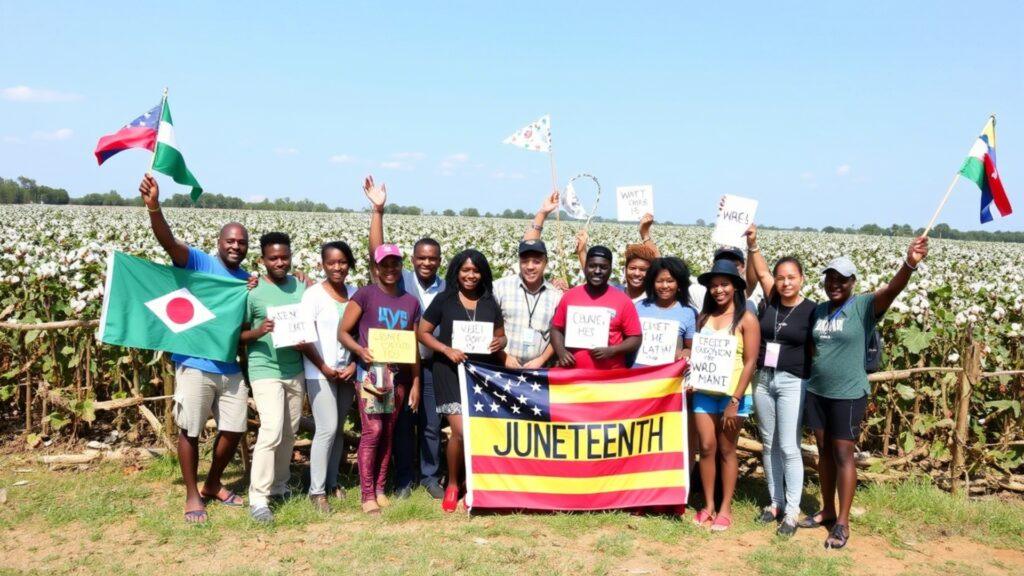
Theme: Labor, transition, new beginnings
The sun was already hot when Elijah bent to pick the cotton.
He could feel sweat gather behind his ears. His hands were raw. The air was thick with silence. No one sang that day.
No birds.
No wind.
Just the creak of old baskets and the slow bending of backs.
It was June 19, 1865.
Elijah was 17.
And he didn’t know it was going to be the last cotton row he ever picked.
His mama had tried to keep him inside that morning.
“Just stay put,” she said, eyes nervous, hands fidgeting. “Just today.”
But Elijah shook his head. “I ain’t gonna get whipped, Mama.”
She held his face in both her hands and whispered, “I feel something in the air.”
The overseer was nowhere to be seen.
Usually, he stood tall and angry by the fence. Today, his chair was empty. The house looked closed up, curtains pulled tight.
Still, no one stopped working.
That’s how deep fear runs.
Even when there’s no whip, your back remembers the sound.
Even when there’s no voice shouting orders, your hands don’t know how to stop moving.
Elijah picked one row.
Then another.
His younger sister Ruthie kept up beside him, her little fingers bleeding.
He looked at her and felt something twist in his chest.
There had to be more than this.
There had to be.
By midmorning, a sound drifted over the fields.
Horse hooves.
Marching feet.
Voices shouting—clear, loud, and not angry.
Everyone froze.
Elijah stood up straight for the first time in hours.
He saw the flag first—bright and waving in the sun. Blue uniforms. Dust rising.
Then a man stepped forward, stood on a wooden crate near the edge of the fields, and pulled out a piece of paper.
He began to read.
“This is General Order Number Three…”
The words rang strange and mighty in Elijah’s ears.
“…all slaves are free.”
No one moved.
Not at first.
Then someone—maybe Ruthie—let out a single gasp.
And a woman dropped to her knees in the row and began to sob.
Free?
Was that what he said?
Elijah looked at Mama. She was crying, but standing proud.
Then he looked down at the cotton still clutched in his hand.
He let it fall.
They didn’t shout. They didn’t run.
They just stood there—shoulders straightening, breathing deep, like the sky itself had cracked open and poured light down.
A few laughed.
Some sang.
But Elijah just stood in his row, staring.
Not because he didn’t believe it.
Because he wanted to remember.
That day became a blur.
People gathered outside the house. Some prayed. Some hugged. Some didn’t know what to do with their hands.
The white folks never came out.
The soldiers didn’t stay long.
But their words did.
The next morning, Elijah went back to the field.
Not to work.
To look.
He walked each row, slow and steady, like walking through the chapters of a book he never wanted to read again.
He knelt in the dirt of that last row.
He placed his hand on the earth and whispered, “I’m not yours anymore.”
They packed what little they had—mostly memories.
Some folks left. Some stayed.
Mama said, “We’re going to the river. That’s where freedom feels real.”
So they walked.
Three days, barefoot, sleeping under trees, eating from tin cans, holding each other close when the night got cold.
At the river, they found others—families, strangers, cousins once lost and now found.
People who looked like hope.
People who talked about freedom with trembling voices and big dreams.
One old man named Brother Moses took Elijah aside.
“You ever farm something you wanted to grow?” he asked.
Elijah shook his head. “Only cotton.”
“Well,” Moses said, “freedom’s like planting something new. It ain’t easy. But it’s yours.”
They built tents.
They fished.
They shared songs.
And every night, someone told a story.
Of mothers who waited.
Of children stolen.
Of prayers whispered into the wind.
And always—always—they ended with what happened that day.
June 19.
Galveston.
General Order Number Three.
Years passed.
Elijah grew older. Married. Had a son.
He taught the boy how to read, how to fish, how to walk tall.
He never picked cotton again.
But every year, on June 19, he went back to that field.
Just to stand in that last row.
Sometimes he cried.
Sometimes he smiled.
Once, he brought his boy and told him the whole story.
“These hands,” he said, holding them out, “used to bleed. Now they build.”
When Elijah died, his son buried him near the river, under an old tree that bloomed red flowers in the summer.
On the headstone, they carved simple words:
Elijah Brooks
Born Bound.
Died Free.
June 19, 1865 — The Day Everything Changed.
Today, the field where Elijah worked is just open land.
Grass grows where cotton once did.
No fences.
No overseers.
Just wind and sky.
Sometimes people visit the place.
They say it feels quiet.
Holy, even.
Like the earth remembers the footsteps of a boy who picked one last row and walked away into freedom.
And maybe that’s what Juneteenth is.
Not fireworks or loud parades.
Not even a speech.
Maybe it’s just standing still in the place where pain once lived, and saying:
Not again.
Not anymore.
Not ever.
5. The Red Velvet Cake Club
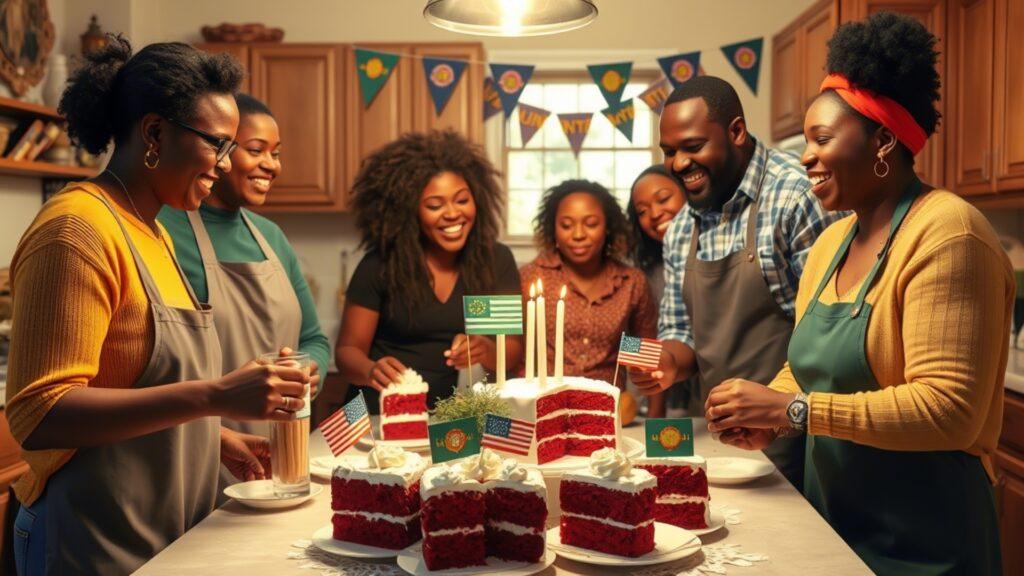
Theme: Celebration, sisterhood, healing
It all started with a slice of cake.
Not just any cake.
Red velvet. Cream cheese frosting. Light as a whisper, rich as a secret.
That’s what Miss Bernice always brought to the Juneteenth gathering in the church basement.
People said it tasted like memory.
Like something sweet hiding inside something deep.
Every year, Miss Bernice came early.
She set her cake down right in the center of the long folding table, always on the same red-glass platter. She’d smooth the frosting with a silver spatula, straighten the edges of the red gingham cloth, and then sit down in her usual folding chair.
And every year, without fail, someone would ask, “Miss Bernice, you ever gonna give up that recipe?”
And every year, she’d just smile.
“No, baby,” she’d say. “But I’ll tell you the story behind it.”
That was how it began.
The story.
It was always the same, and always just a little different.
“My grandmama,” Miss Bernice would say, “used to bake this same cake, back in East Texas, long before I was born. She only made it on Juneteenth. Said red stood for the blood that got us free. Said the cake was sweet because freedom was too. Said it rose in the oven like we rose that day—up and out.”
The crowd always got quiet when she said that part.
Even the kids stopped fidgeting.
Miss Bernice would go on:
“She made it for the first big picnic they had—June 19, 1870-something. Nobody had much. But they had each other. And a few people brought red things. Red punch. Red beans. Watermelon. And my grandmama, she brought red velvet cake.”
“She called it ‘freedom food.’”
It wasn’t just about the cake.
That was what people came to understand.
The story became part of the tradition. More than the parade. More than the speeches. Even more than the music.
After all, you can forget a firework.
But you don’t forget a slice of cake handed to you with a story and a smile.
Then one year, something changed.
Miss Bernice didn’t show up.
The cake table sat empty in the middle.
People kept glancing at the door.
Some whispered. Some waited.
But the red platter never came.
That night, word went around: Miss Bernice was in the hospital.
Nothing serious, they said. Just old bones and a tired heart.
Still, it felt like something was missing.
Like a note left out of a favorite song.
The next day, five women showed up at her house.
They had notebooks and aprons and determined looks.
“We’re not leaving,” said one, “until you teach us.”
Miss Bernice tried to laugh them off.
“You really think I’m gonna give up my secret now?”
But they just pulled out mixing bowls.
And waited.
Finally, Miss Bernice gave in.
“All right,” she sighed. “But if you’re gonna do it, you’re gonna do it right.”
And so, in that tiny kitchen, something new was born.
The Red Velvet Cake Club.
They met every week that summer.
Not just to bake—but to learn the story.
Miss Bernice made them recite it.
Over and over.
Not just her grandmama’s part, but all of it.
The marches.
The cookouts.
The songs sung low by firelight.
The tears shed at graves marked and unmarked.
The prayers whispered before freedom came.
“If you gonna serve this cake,” Miss Bernice said, “you better know why it matters.”
And they did.
Each woman learned to make it just right.
They got the balance perfect—cocoa, vinegar, buttermilk. They used the right pans. They folded the batter slow.
Miss Bernice even made them walk the cake across the room to practice how to carry it with pride.
“It’s not just dessert,” she said. “It’s dignity.”
That Juneteenth, five red velvet cakes sat on the table.
Different shapes, different frostings—but all with the same story behind them.
Miss Bernice came late, wearing her Sunday best and a wide-brimmed hat.
She looked at the cakes. Looked at the women.
Then nodded.
“I can sit down now.”
From that day on, the Red Velvet Cake Club grew.
More women joined. Then a few men.
Young folks. Teenagers. Elders who’d never baked a thing in their lives.
Some just came for the story.
One year, they added something new.
A blank book.
They called it The Freedom Recipe Journal.
Each person who made the cake wrote something in it—memories of their family, a prayer, a name, a song.
One girl wrote:
“My great-granddaddy never got to eat red velvet cake. He died before he tasted freedom. So I baked this for him.”
Over time, the club started mailing cakes across the country.
To relatives. To soldiers. To activists. To people who needed reminding that sweetness could still rise.
And each one came with a card:
“This cake was born on June 19. Baked with memory. Frosted with love. Eat slow. Think deep.”
Then, one quiet spring morning, Miss Bernice passed.
Peacefully.
In her sleep.
They buried her with a silver spatula in her hands and red roses on her grave.
And that year, on Juneteenth, twenty cakes filled the table.
Not one tasted exactly the same.
But all of them held her story.
Somewhere today, someone is mixing batter and whispering words handed down like scripture.
Someone is setting a cake on a table with trembling hands.
Someone is telling the story of a woman who believed sweetness could carry history.
And someone—maybe you—will take a bite and feel something you can’t quite name.
That’s what Juneteenth tastes like.
That’s what remembering feels like.
6. Free in the Sky

Theme: Loss, imagination, mental escape
The sky over Louisiana was wide and blue when Moses first looked up and imagined flying.
He was ten years old.
He had never seen a bird up close. But he watched them every day—swooping, soaring, dipping through the cotton-colored clouds.
He didn’t have words for it yet.
But he knew what he felt.
He wanted to be free. Like the birds.
Moses was born into slavery.
His mama told him stories at night, when the stars were out.
She told him his great-granddaddy had been stolen from Africa.
She told him they used to run free over hills and rivers.
“Before the chains,” she whispered, “we were wind.”
He’d whisper back, “I want to be wind too, Mama.”
And she’d smile, tired but proud. “Then one day, baby, you will.”
When he wasn’t working, Moses would sneak behind the stables and build little wings from sticks and feed sacks.
He’d tie them to his arms with twine.
He’d run across the field and flap as hard as he could.
Of course, he never left the ground.
But every time, he felt something rise inside him.
The older boys laughed.
“You gonna fly your way to freedom?”
Moses just grinned.
“Maybe I will.”
Then came June 19, 1865.
A rider galloped through the road shouting something strange.
“Freedom! Freedom!”
No one believed it.
Not right away.
But that evening, the master left the house and never came back.
And the next morning, a man in uniform read from a paper in the middle of town.
“All slaves are free.”
Moses stood in the back, clutching his mama’s hand.
“Did he say free, Mama?” he whispered.
She couldn’t speak.
She just nodded, tears in her eyes.
For days, nobody knew what to do.
Some left.
Some stayed.
But Moses climbed up to the barn roof and sat in the sun for hours.
He looked at the birds.
He looked at the sky.
He opened his arms.
And this time, he felt lighter.
That night, he told his mama, “I still want to fly.”
She said, “Then you find a way.”
He worked odd jobs.
Saved every coin.
He walked for miles to a library that let Black folks read only on Sundays.
And there, he found it:
A book on flight.
Drawings of wings.
Notes about air currents.
He couldn’t understand most of it. But he studied every line.
He drew his own pictures on scraps of cloth.
When he turned 18, he moved to New Orleans.
He cleaned floors by day and built gliders at night.
People called him crazy.
But some called him dreamer.
He liked that better.
One day, he met an old Black man who worked at the docks.
The man had once been a sailor.
He’d seen kites in China. He’d seen air balloons in France.
He showed Moses how to shape canvas.
How to stitch seams strong.
They worked side by side, building something strange and beautiful.
They called it the Freedom Kite.
It was red and gold, wide as a rowboat, and stitched with the names of everyone Moses had lost.
His mama.
His uncle who vanished after a beating.
The baby sister who didn’t make it.
On June 19, 1885—twenty years to the day—Moses stood on a tall hill outside the city.
A crowd had gathered. Black families. Children in Sunday clothes. Elders in rocking chairs.
Moses strapped on the kite like wings.
He looked up at the sky.
Then ran.
No, he didn’t fly.
Not really.
He glided.
For ten glorious seconds, he floated above the grass, the air holding him like a promise.
People gasped. Cheered. Cried.
When he landed, he knelt in the dirt and laughed like a boy again.
“Did you see me?” he asked.
The children ran up and hugged him.
“You were in the sky, Mister Moses!”
After that, every Juneteenth, Moses brought his kite.
He taught children how to build their own.
They used colored cloth and wrote their family names on the wings.
And they all ran across the field, laughing, flying for just a moment.
They called it the Sky Parade.
Years passed.
Moses grew old.
His knees ached. His back bent.
But his heart?
Still light.
Still looking up.
When he died, people from all over came to his funeral.
Not with flowers.
But with kites.
Hundreds of them.
They filled the sky that afternoon.
Red. Gold. Blue. Green.
Names written bold across the cloth.
And someone whispered, “Look. Moses finally got his wings.”
Now, every Juneteenth, there’s a hill outside New Orleans.
Children climb it with homemade kites.
They run. They laugh. They fall. They fly.
And in the sky above them, you can almost see a boy with canvas wings, riding the wind.
Because freedom isn’t just something you’re given.
It’s something you feel.
In your chest.
In your bones.
In the sky.
7. The Fireflies of Freedom
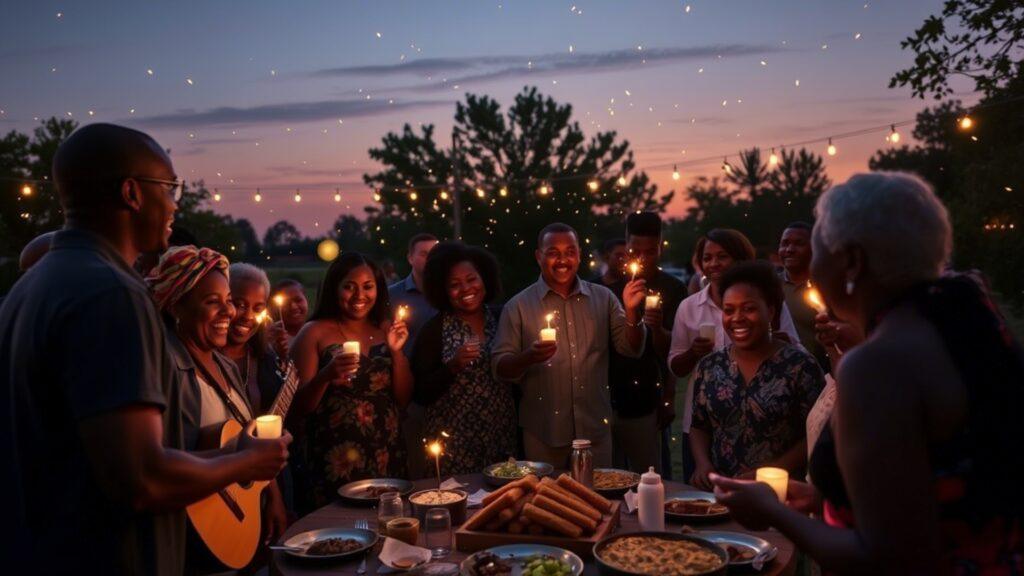
Theme: Hope, memory, intergenerational storytelling
A glowing Juneteenth story about memory, light, and quiet hope
The fireflies always came back in June.
Like they remembered, even when people forgot.
They blinked through the night air, slow and soft, weaving gold through the dark.
To some, they were just bugs.
But to Miss Lila, they were history.
Living sparks of a story that had never fully died.
Every year, on the evening of June 19, Miss Lila sat on her back porch in the tall grass with a jar on her lap, a lantern by her feet, and her memories tucked inside her chest.
She wasn’t sure how old she was anymore.
She just knew she’d lived through more summers than most.
And each one had carried its own kind of heat.
“Tell us the story again,” her grandson would say.
So she’d lean back in the creaky chair, listen to the whippoorwill’s song, and begin.
“You know I was born in the same house your mama grew up in,” she said.
“Right over that hill. No running water. Tin roof. Oak tree out front.”
“Your great-great-grandma—Ruthie—she was the first in our line to be born free.”
That always made the kids go quiet.
They had grown up in a world of phones and electric fans.
But that word—free—still hit the air like a bell.
“She was just a baby when the soldiers came through,” Miss Lila said.
“Galveston. June 1865.”
“Folks out in the fields heard something was going on in town. Said the war was over. Said we were free.”
“But nobody knew what to believe.”
“Not at first.”
Great-Grandma Ruthie told the story to Lila when she was a little girl.
Said the men came on horses with papers in hand and told the people what the government had said two years earlier.
Slavery was done.
They were free.
But it didn’t feel real yet.
That night, the grown-ups sat under the stars in silence.
Some cried.
Some sang.
Some just stared into the fire, not sure what tomorrow would bring.
They didn’t have a parade.
They didn’t have flags.
But then something small happened.
Something simple.
The fireflies came out.
Little lights, floating like quiet joy through the trees.
And one of the old women said, “That’s the ancestors dancing.”
“They waited a long time for this.”
From that moment on, Ruthie believed the fireflies came every Juneteenth just for them.
A secret celebration in the woods.
A freedom lantern in every blink.
Miss Lila had kept that story close all her life.
She told it to her children.
She told it to the neighbor’s children.
She told it to anyone who would listen.
But fewer people were asking now.
The old neighborhood had changed.
Families moved away.
The new folks didn’t know what Juneteenth was.
Didn’t know about Ruthie.
Didn’t know about the fireflies.
Still, every year, Lila sat in her chair with a jar in hand.
Not to catch them—but to remember.
She didn’t need a big crowd.
Didn’t need speeches or stage lights.
She just needed the stars, the grass, and the flicker of gold through the trees.
Then one year, her grandson Elijah came home from college.
He brought two friends with him.
They sat out back with Lila and asked, “So what’s this holiday really about?”
Lila smiled.
And told them everything.
About Galveston.
About Ruthie.
About the silence and the songs and the soft glow in the woods.
And as she spoke, fireflies began to rise from the grass.
Dozens of them.
Then hundreds.
The boys sat wide-eyed, quiet for once.
“This,” Elijah whispered, “feels like church.”
Lila nodded.
“It is, baby. A quiet kind. One where God don’t need a roof.”
The next year, more people came.
Not just Elijah.
Not just friends.
Neighbors. Cousins. Strangers.
All sitting in the yard with mason jars and open hearts.
Lila lit a single lantern and passed it around.
Everyone touched it.
Everyone shared a name or a memory.
Then they let the fireflies dance around them.
One woman cried.
She said her grandma had never talked about slavery.
Had never even said the word “Juneteenth.”
“She kept it locked inside,” the woman said.
“But tonight, I think I can feel her.”
A child asked, “Can we call them the Freedom Fireflies?”
Lila smiled, “You can call them anything you want, baby. Long as you don’t forget why they shine.”
And from then on, people came back every year.
They didn’t post about it online.
They didn’t sell tickets.
It wasn’t loud.
It wasn’t fancy.
But it was deep.
A tradition born of shadows and stars.
As Lila got older, her legs stopped working the way they used to.
But her voice stayed strong.
The kids helped her to the porch, wrapped her in quilts, and held her hands.
She still lit the first lantern.
Still told the story.
Still waited for the blink of gold.
And the fireflies?
They never failed.
One year, after Lila had passed, Elijah found her jar.
It was empty.
But he said it glowed when he touched it.
Maybe just for a second.
Maybe just for him.
He set it on the porch that June 19.
And when the fireflies came, he opened the lid.
“Go on,” he whispered. “Tell her we remember.”
Now, each Juneteenth night, people gather in that same backyard.
Kids chase lights with laughter.
Elders sit in chairs, whispering stories.
Someone reads a name. Someone sings a song.
Someone just looks up at the sky and breathes.
No fireworks.
No marching bands.
Just fireflies and memory.
Some say the blinking lights are science.
Some say they’re spirit.
Some say they’re both.
But everyone agrees—they shine brighter on Juneteenth.
Because freedom, too, can be soft.
It doesn’t always shout.
Sometimes, it glows.
Quiet and alive.
Like hope in the dark.
Background on Juneteenth
Juneteenth is the day freedom finally reached everyone.
Even though slavery had ended on paper, many didn’t know they were free until much later. Juneteenth tells that story—a story of waiting, hope, and a new beginning.
What Happened on June 19, 1865
The Emancipation Proclamation was signed in 1863. But it didn’t free everyone right away. In fact, it took over two and a half years for many people to even hear the news.
On June 19, 1865, Union soldiers arrived in Galveston, Texas. They told the last group of enslaved African Americans that they were finally free. This moment was powerful. It was late—but it was real.
That day became known as Juneteenth—a mix of “June” and “nineteenth.”
At first, only people in Texas celebrated it. But over time, the meaning spread. It became a symbol of freedom, resilience, and delayed justice. In 2021, Juneteenth became a national holiday in the United States.
Why It’s So Important
Juneteenth is about truth. It’s about freedom delayed, but not denied.
It honors the strength of those who waited, hoped, and never gave up. It’s about families. It’s about communities. It’s about how people kept living and loving, even in the face of injustice.
People celebrate with:
- Music and dancing
- Barbecues and red drinks
- Church services
- Parades
- Storytelling
And the stories? They’re what tie it all together. Stories keep the past alive. They let us feel it, not just know it.
Why Short Stories Work So Well?
Short stories do something special.
They’re quick to read—but they leave a mark. A single moment. A single voice. A single scene. Yet they can shift how we see the world.
You don’t need a big textbook. You don’t need hours of study.
You just need one good story. It can change how you understand history. It can show you what freedom felt like to someone who lived it.
Short stories are:
- Easy to finish in one sitting
- Great for personal time or group reading
- Perfect for sharing and discussing
- Emotional, honest, and real
How We Chose These Stories?
We picked short Juneteenth stories that are easy to read, full of feeling, and written with care. Each one gives a real, powerful glimpse into freedom, family, and history.
Short Length
All the stories in this guide are under 5,000 words. That means you can read one during a lunch break or while drinking your morning coffee.
You don’t have to set aside hours. Just a little quiet time.
Written for Adults
These stories don’t sugarcoat things. They deal with:
- Grief
- Freedom
- Family
- Anger
- Hope
They don’t talk down to you. They speak to your heart. They’re honest, human, and respectful.
Different Voices and Places
Freedom looked different in every town, every home, every heart.
Some of the stories come from:
- Big cities
- Small southern towns
- Northern neighborhoods
- Families passed down through generations
Some are told by elders. Others by young people. Some are fictional, but deeply real. Others are based on true stories.
The range of voices matters. That’s how we build a bigger picture of what Juneteenth really means.
Great Writing
We picked stories with:
- Strong, clear voices
- Scenes you can picture
- Emotions that feel real
- Words that stay with you
Even days after reading, you’ll remember how the story made you feel.
Easy to Find
For each story, we’ll share how to read or buy it—whether it’s:
- Online
- In a book
- In a magazine
- Or part of a free archive
So you won’t have to search far.
How to Read & Discuss?
These stories are meant to be felt, not just read.
You can read them alone in a quiet moment or share them with others. Talk about what moved you, light a candle, or just sit under the stars. Juneteenth is about remembering together.
Reading Alone
Reading on your own can be powerful. Here’s how:
- Set aside 30–60 minutes on or around June 19.
- Make the space quiet and peaceful.
- Write down your thoughts as you read. What stood out?
- Ask yourself: How did this story make me feel? What did I learn?
It’s okay to cry. It’s okay to sit with big feelings. That’s what stories are for.
Reading With Others
Want to share the experience? Try this:
- Pick one short story.
- Read it aloud or silently together.
- Share your favorite lines.
- Talk about what surprised or moved you.
- Make it a full experience—eat red velvet cake, sip hibiscus tea, play freedom songs in the background.
More Ideas
Make Juneteenth meaningful in your own way:
- Look up events in your city or neighborhood.
- Ask older family members what freedom means to them.
- Write your own story—about your family, your past, or your hope for the future.
You don’t need to be a writer. Just be honest.
Conclusion
Juneteenth short stories help us feel history—not just read about it.
They show us what freedom really meant. Not just in big speeches or dates—but in small moments, quiet hopes, and bold dreams.
When we read these stories, we connect. We remember. We grow.
So this Juneteenth:
- Pick a story.
- Read it slowly.
- Talk about it with someone you trust.
- Think about your own story. What would you write, if you lived through that day?
Start with just one story. Let it speak to you.
That’s how we remember. That’s how we grow.
Mark Richards is the creative mind behind Classica FM, a podcast platform that brings stories, knowledge, and inspiration to listeners of all ages. With a passion for storytelling and a love for diverse topics, he curates engaging content—from kids’ tales to thought-provoking discussions for young adults.



